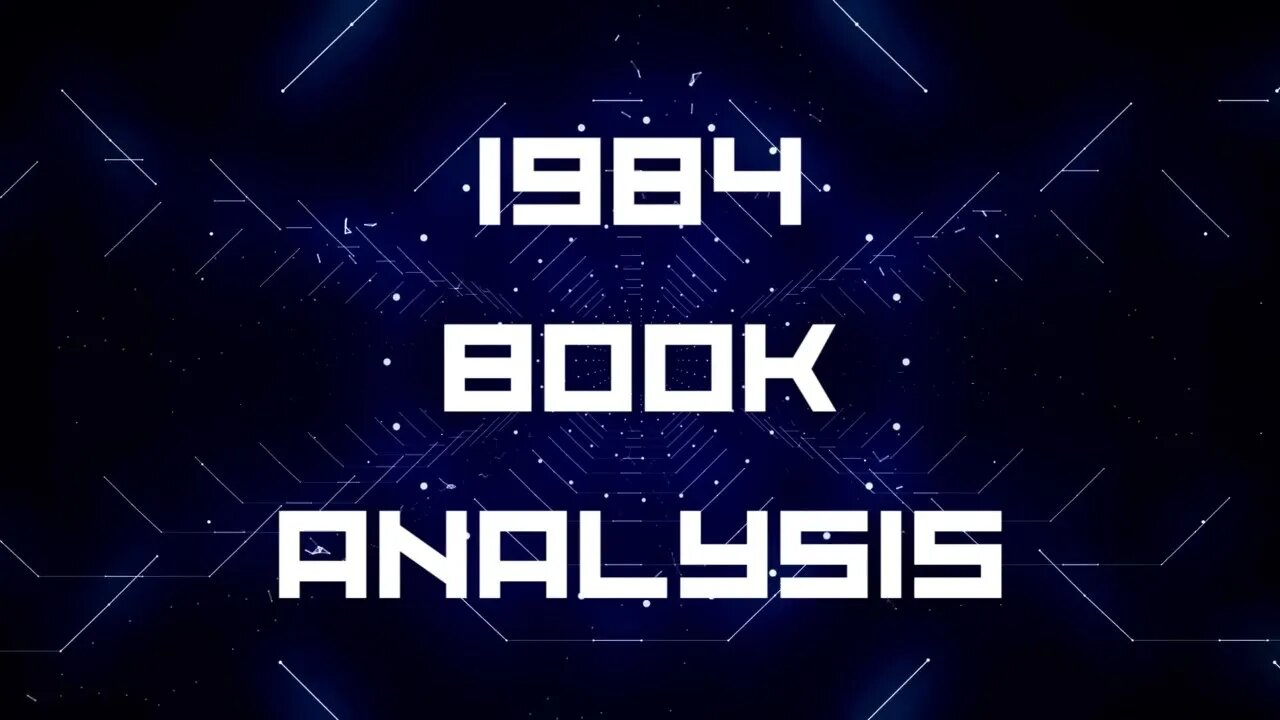Premium Only Content

1984 Book Analysis | A Novel by George Orwell
Welcome back to our channel, where we explore thought-provoking literary works. Today, we delve into George Orwell's iconic novel, "1984". In this video, we'll analyze the book's themes, characters, and the unsettling vision of a dystopian society it presents.
Introduction to 1984.
Published in 1949, "1984" takes us to a totalitarian society ruled by the Party, led by the enigmatic figure known as Big Brother. The story follows Winston Smith, an ordinary citizen who rebels against the Party's oppressive regime.
Themes.
One of the prominent themes in "1984" is the dangers of totalitarianism. Orwell vividly portrays a society where individuality and independent thought are suppressed, and the government controls every aspect of citizens' lives.
Another significant theme is the power of language. The Party's implementation of Newspeak, a language designed to limit free expression, reflects their desire to control and manipulate the thoughts and ideas of the population.
Characters.
Let's now explore the key characters in "1984". Winston Smith, the protagonist, represents the common individual longing for freedom and truth in an oppressive world. His journey of rebellion and self-discovery forms the backbone of the narrative.
Julia, Winston's love interest, symbolizes youthful rebellion and a desire for personal pleasure. Her character adds an element of hope and defiance to the story.
O'Brien, a high-ranking member of the Party, serves as a menacing figure who embodies the Party's control and manipulation. His interactions with Winston reveal the depths of the Party's surveillance and psychological control.
The Dystopian Society.
Orwell's depiction of the dystopian society in "1984" is chillingly relevant even today. The constant surveillance, the rewriting of history, and the pervasive propaganda all serve as cautionary reminders of the dangers of unchecked government power.
The Party's slogan, "War is Peace, Freedom is Slavery, Ignorance is Strength," encapsulates the manipulation of language and the distortion of truth to maintain control over the citizens.
Impact and Legacy.
"1984" continues to resonate with readers worldwide. Its portrayal of authoritarianism, surveillance, and the erosion of individual liberties remains a stark warning against the abuse of power.
The novel has influenced popular culture, with phrases like "Big Brother" and "Orwellian" entering our everyday language, signifying a society characterized by surveillance and oppression.
Conclusion.
As we conclude this analysis of George Orwell's "1984," we are reminded of the importance of vigilance and the defense of individual freedoms. The novel serves as a stark reminder of the potential consequences when governments infringe upon personal liberties and manipulate information.
Thank you for joining us today. We hope this analysis has deepened your understanding of "1984" and its enduring significance. Remember to like and subscribe to our channel for more thought-provoking literary discussions. Until next time!
This has been our analysis of George Orwell's "1984". Stay curious, keep reading, and never stop questioning the world around you.
For more visit:
https://askliterature.com
00:00 - Introduction
00:18 - Introduction to 1984
00:38 - Themes
01:10 - Characters
01:53 - The Dystopian Society
02:23 - Impact and Legacy
02:51 - Conclusion
00:00 - Introduction
00:00 - Introduction
00:00 - Introduction
00:00 - Introduction
-
 56:32
56:32
Candace Show Podcast
4 hours agoOH SNAP! Justin Baldoni Is Now Suing Blake Lively and Ryan Reynolds PERSONALLY | Candace Ep 134
76.6K80 -
 LIVE
LIVE
Havoc
1 hour agoHell on Earth | Stuck Off the Realness Ep. 24
135 watching -
 11:32
11:32
Tundra Tactical
2 hours agoATF Violates Court Order to ATTACK Americans.
6.74K1 -
 LIVE
LIVE
Common Threads
2 hours agoLIVE DEBATE: Will Mainstream Media Survive a 2nd Trump Term?
108 watching -
 LIVE
LIVE
Quite Frankly
6 hours ago"Biden's Farewell, Dreams For Sale, Spy Hunting, and Open Lines" 1/16/25
1,275 watching -
 LIVE
LIVE
Sarah Westall
1 hour agoCalifornia puts Children 2nd to Big Pharma Profits, Chemically Castrating Boy w/out Dad’s Consent
177 watching -
 LIVE
LIVE
theDaily302
11 hours agoThe Daily 302- Craig "Sawman" Sawyer
58 watching -
 11:45
11:45
Reforge Gaming
9 hours agoHalo on PS5 - Nothing is Sacred
9.63K1 -
 52:05
52:05
PMG
20 hours ago $0.34 earnedWhat "Does Freedom Cost? Steven Soloman's On-the-Ground Documentary in Ukraine"
10K -
 1:03:43
1:03:43
In The Litter Box w/ Jewels & Catturd
1 day agoFlaming Crack Doodles | In the Litter Box w/ Jewels & Catturd – Ep. 721 – 1/16/2025
81.9K35